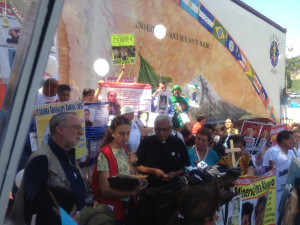Language Justice
 If you are interested in learning more about language justice and building multilingual spaces, please download a copy of our how-to guide How to Build Language Justice on our Libros Antena Books page.
If you are interested in learning more about language justice and building multilingual spaces, please download a copy of our how-to guide How to Build Language Justice on our Libros Antena Books page.
You can also read and use this amazing Checklist for Building Multilingual Spaces developed by Antena Los Ángeles.
Here are some other resources that might be helpful:
Resources Developed by Antena Los Ángeles
Antena Los Ángeles Best Practices for Interpreting with Language Justice Framework
Antena Los Ángeles Checklist for Building Multilingual Space
Antena Los Ángeles Multilingual Video Conference Guidelines for Facilitators
Antena Los Ángeles Multilingual Video Conference Guidelines for Interpreters
Resources Developed by Antena Aire
How to Build Language Justice at Libros Antena Books page
Resources Developed by Other Language Justice Organizers
Catalina Nieto’s Language Justice Tips for Virtual Events
Zoom Interpretation Function: Tips and Troubleshoots for Facilitators and Organizers. Co-created by Jen Hofer (Antena Los Ángeles), Telesh López, and Catalina Nieto.
Zoom Interpretation Function: Tips and Hacks for Interpreters. Co-created by Jen Hofer (Antena Los Ángeles), Telesh López, and Catalina Nieto.
Glossary of Interpreting Terms. Co-created by Jen Hofer (Antena Los Ángeles) with Cynthia Martínez, Nora Ramírez, and Alena Uliasz from California Rural Legal Assistance.
Interpretation And Translation: Power Tools For Sharing Power In Grassroots Leadership Development, by Alice Johnson.
The Language Justice Circle of the Center for Participatory Change in Asheville, North Carolina, focuses on developing the capacity of interpreters, translators and language justice workers to create multilingual movement spaces, build analysis, and develop and deepen relationships.
The Language Justice Circle of the Center for Participatory Change also has a Youtube Channel with a super helpful Online Interpreter Training Course and Interpreter Skill-Building Videos:
Se Ve Se Escucha (Seen and Heard) is a podcast by the Center for Participatory Change about language justice and what it means to be an interpreter, an organizer and bilingual in the U.S. South.
What Did They Say? A Social Change Interpreter Curriculum, by Roberto Tijerina.
++++A bit of history:Originally, at Antena’s founding in 2010, we thought of it as a collective effort dedicated to organizing, interpreting, and/or creating multilingual spaces. By 2014-15, the daily grassroots work of building language justice shifted to local collectives in Houston and Los Ángeles, as Antena Aire focused more specifically on language experimentation, co-writing, co-translating, and other aesthetic and political adventures.
Antena Houston and Antena Los Ángeles organized for language justice, by working with groups, organizations, and communities to create dynamic, well-functioning multilingual spaces. While these collectives primarily worked with Spanish and English, each collective had experiences collaborating with communities of more diverse multilingualism.
A sampling of organizations where Antena Aire and its local sister organizations did interpreting and language justice consulting:
Blaffer Art Museum – Project South – Physicians for Social Responsibility – UC Irvine Sustainability Initiative Nexus 2014 Global Gathering on Climate, Environmental Health & Justice – Hemispheric Institute of Performance and Politics – &Now Festival – University of Texas Health Science Center – Latino Day Laborers Injury Disparities Project, Community Advisory Board – Houston Peace and Justice Center – Economic Justice Conference – Studio Enertia – Los Angeles Public Library Aloud Series – Caravan for Peace with Justice and Dignity – Project Row Houses – Project South – Critical Ethnic Studies and the Future of Genocide Conference, UC Riverside – National Immigration Law Center – Political Equator 3 – YAhora – US Social Forum
